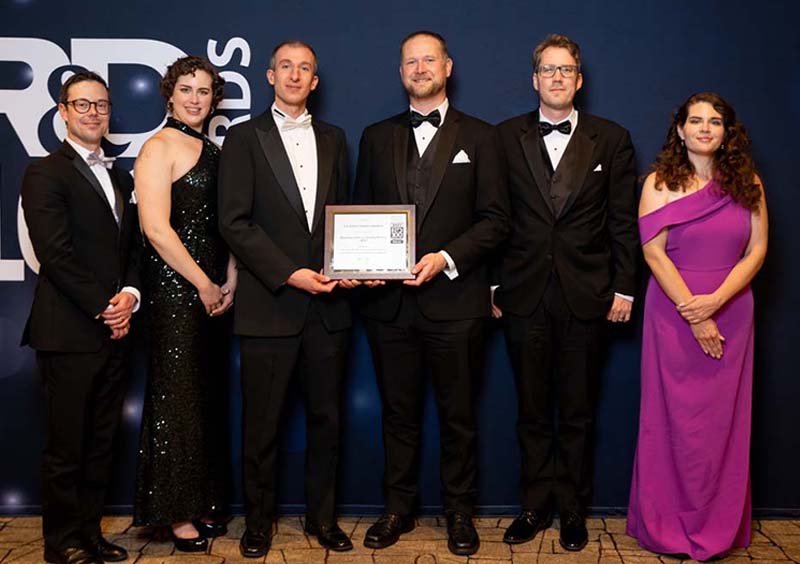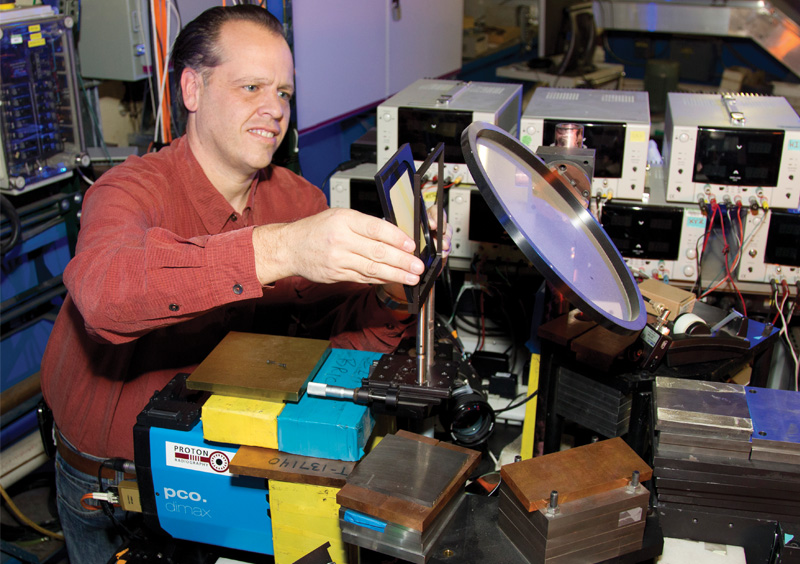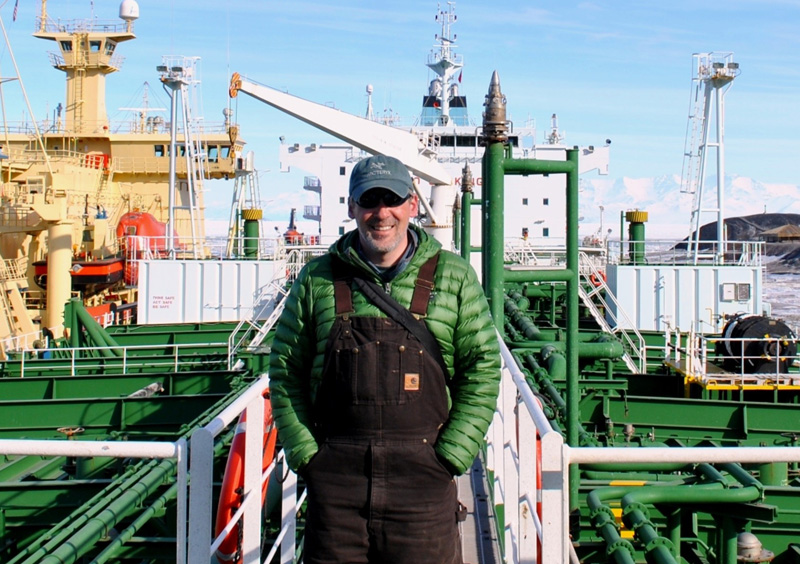Zachary Alhamra
When Zachary Alhamra arrived at the starting line of the 129th Boston Marathon this April, it was more than 10 years after his running career had seemingly fallen apart. As a high school junior in 2013, he was named the Gatorade Colorado Runner of the Year, setting up what was supposed to be a dominant senior year. But the following autumn — one day before his 18th birthday — in the cross-country state championship, Zachary's body gave out.
"I was overtrained, overworked and my body just shut down," says Zachary, a nuclear facilities engineer in the Lab’s Programmatic and Glovebox Systems group. "It was a really rough experience. Before Boston, I would've said that's the moment my running career ended."
The performance sapped him physically and psychologically. His heart wasn't in running anymore. At Duke University, Zachary focused on his engineering classes and ran less.
"From that point, I didn't have any belief in my running abilities. I didn't want to try because I was worried about failing again," he says. "I focused on other things and was very lost for a long time."
Eventually, Zachary's running spark reignited. In 2021, with minimal training, he signed up for the St. George Marathon in Utah. His time was 2:32:00 flat — an incredible time given his lack of training. Over the next three years, Zachary competed in five marathons and consistently finished in the 2:30s. He refused to take running seriously, though, worried that if he truly reinvested, he'd have to give up newer interests while running the risk of being crushed again. It took a conversation with his high school coach to reconsider.
"He said, 'You're wasting a ridiculous amount of natural talent,'" Zachary says. "‘You can ski until your 70s. You're not going to be able to run a marathon at an elite level when you're 70.'"

In December 2024, for the first time in years, Zachary began running with purpose, building from 45-mile weeks to 90-mile weeks.
His dedication paid off.
In Boston, he had just opened onto Hereford Street — the penultimate stretch of road before Boylston Street where the race ends — and was set to smash his goal. The crowd's surging energy matched his acceleration as he zipped past other runners. He sprinted across the finish line and clocked a time of 2:22:57. For the first time in years, Zachary had committed himself to running, and he finished 72nd out of more than 28,000 runners.
Now, years after he nearly gave up on running, Zachary is close to the projected U.S. Olympic Trials standard. The standard was 2:18:00 for Paris 2024 and is expected to be around 2:17:00 for Los Angeles 2028. When asked what changed, Zachary says he feels freer. In high school, he was burdened with a level of expectation that was difficult to cope with.
"The state championship was a moment of great humiliation for me," Zachary says. "I went into hiding after that. I wasn't going to run anymore; it wasn't worth it."
He says he has matured in how he approaches running. Regardless of performance, his goal is to enjoy the process.
"I know that even if I train really hard and do the right things, I can get on that line and still blow up spectacularly," Zachary says. "The difference now is I'm OK with that, and I'll laugh if it happens. It won't be the happiest day of my life like Boston was, but I'll still be OK. There's no pressure anymore."

Jonathan Grimm
In 2017, Jonathan Grimm — a process engineer in Pit Technologies, a Lab division that develops and produces plutonium pits — passed up an opportunity that many runners only dream of. In his first marathon, Jonathan finished fast enough to qualify for the Boston Marathon, but he decided not to run.
"I was still in college, about to start my junior year, and I had no idea how demanding my engineering classes were going to be. I didn't want running to become a distraction," Jonathan says. "So, I decided not to run it, and I always regretted that choice."
Years later, Jonathan attempted to requalify for Boston, but entrance into the race was more competitive as the qualifying standard kept getting faster. Jonathan also was battling personal setbacks.
"Every time I trained for a qualifying marathon, injuries kept getting in the way," Jonathan says. "Since my first race in 2017, I attempted to train for three or four different marathons to requalify for Boston, but each time I got injured deep into the training cycle."
In fall 2024, he geared up for another shot at the race and aced his qualifier. He finished comfortably under the 2:53:09 standard with a time of 2:48:42.
With a qualifying time in hand, Jonathan began preparing for race day. As someone who frequently works late at the Lab, he spent many winter hours, well after the sun went down, at Los Alamos High School's track.
"Having the track open to the public is incredibly convenient, and training at elevation is the biggest advantage you can get," Jonathan says. "Whenever you run in Los Alamos, you'll see plenty of other runners out, too, which motivates you to keep pushing yourself."
In Boston, Jonathan's training paid off. Ascending Heartbreak Hill — the last of the Newton Hills, a series of four hills from mile 16 to mile 21 — he says he knew he was on track to hit his target time and felt he still had plenty in the tank.
"The hills in Los Alamos really prepared me well. I was incredibly grateful for being able to train on the tough hills in Los Alamos," Jonathan says. "I would have been happy with a 2:50:00 — fast enough to qualify for Boston in 2026 — so when I ran a 2:43:09, I was extremely happy."
Jonathan's time was a marathon personal record, and while the finish — along with the celebration that followed — was deeply gratifying, there were other elements of the race that Jonathan will remember more.
"Walking to the start was a surreal moment — there were thousands of runners walking from Athlete's Village to the start line. During the national anthem, there was a military flyover by two F-15 fighter jets. The culmination of all my training and the thrill of the event gave me chills," Jonathan says. "After crossing the start line in Hopkinton, I felt an overwhelming sense of accomplishment and honor. It's a moment I'll never forget."
Gary Krugger
Gary Krugger, a research technologist in the Lab’s Complex Response Solutions group, has a unique running origin story.
"I started working third shift the summer before my last year in college, and I'd get home at eight in the morning. It'd be light out, and I couldn't sleep, so I would run to tire myself out," Gary says. "I had to run farther and farther, so eventually I thought, 'Why not run a marathon?'"
That was in 2006. In the 19 years since, he has run a little more than one marathon.
"I have 418 marathon finishes, and 100 of them are wins. Nowadays, I do one a month," Gary says.
Entering so many races, Gary organized his approach. First, he wanted to complete a marathon in all 50 states — something that often takes a lifetime. It took Gary just a few years. Then, Gary wanted to see if he could complete a sub-three-hour marathon in every state.

Tracking such a feat is somewhat informal, so it's hard to get a precise count on how many people have reached this goal. The 50sub4 website lists eight people who have accomplished the task — including Gary. At 26 years old, the website also lists Gary as the youngest person to complete the challenge. Gary would also complete the 50 sub-3 circuit a second time, something that only one other runner has done.
Gary's 418 races are organized in a spreadsheet, and mapping them out blankets the country. "If they've got a ZIP code, I've been there," Gary jokes.
Now, with most of his goals ticked off, Gary is choosy about what races he runs. He leans toward events that aren't held in big cities because he enjoys the environment of smaller races. Despite that, the 2025 Boston Marathon was Gary's sixth time running the race.
"The actual running experience is unique," Gary says. "I can't describe it. The city has so much support, everyone comes out; it's part of Boston's heritage."
Gary also has good memories of the course. He points to his 2012 performance in Boston as one of the races he is the proudest of.
"It was 90 degrees that day, and I finished 133rd with a time of 2:44:48," he says. "It was my best performance there under the worst conditions."
Gary's 2025 performance wasn't quite at that level, but it was still solid. His time of 2:54:11 is something he is relatively proud of. Gary acknowledges that injuries, age and running thousands of miles are starting to slow him down. He likes to think he's quasi-retired from running, but he still runs 12-18 miles each day and enters around a dozen races each year. As long as his body supports him, he seems on track to push his number of completed marathons higher, with 500 races fast approaching.
Grant Martin
Mere minutes after Zachary Alhamra crossed the finish line, Grant Martin — a research technologist in the Lab’s Materials, Science and Technology division — finished the Boston Marathon with a time of 2:33:09. The race didn't go the way he hoped (Grant had targeted under 2:20:00), but as a 25-year-old running his second marathon, Grant says there's plenty of room to grow.
"This early into a marathon career, if you want to call it that, I'm just trying to learn," Grant says. "I need to race more. I didn't race in a marathon for almost a year. You lose your race sharpness. You have to be in a certain mindset."
Grant ran for his college, but it wasn't until he moved to Los Alamos that his performance really took off. Training at elevation and surrounded by a community and workplace that promotes physical activity, he transitioned to marathon distance.

In his first marathon in 2024, Grant set the course record for the Light at the End of the Tunnel Marathon in North Bend, Washington, with a time of 2:25:01. Largely downhill, it's one of the fastest courses in the country, attracting runners trying to qualify for Boston.
His time not only qualified him for Boston, but like Zachary, it put him within reach of the projected U.S. Olympic Trials standard for 2028. Boston 2025 was Grant's first attempt at seeing how feasible reaching the standard was, but stomach troubles disrupted his race.
"Around mile 10 I thought I would have to drop out. You have to reevaluate and think, ‘I'm going to try and just finish now,'" Grant says. "It's a tough pill to swallow after you bust your butt for nine months."
While race day was a disappointment, Grant takes satisfaction in his preparation. He was the fittest he had ever been and consistently hit time targets on training runs. He believes he developed a replicable training program that makes reaching the Olympic Trials plausible.
"I had a perfect build in the fall and a perfect build in the winter. I had no injuries, was hitting 90 miles per week for 12 weeks, workouts were great," Grant says. "That's kind of the beauty and curse of the marathon. Sometimes it's just not your day."
Now, Grant plans to run in two or three marathons a year. That means he has five or six more marathons before the Olympic Trial qualifying window opens. He also plans to run shorter races, in part to get back in the racing mindset, but also because running marathons has reignited his competitive fire.
"There's just something about pushing yourself as hard as you possibly can. It's not fun in the moment, but some part of my brain just loves it," Grant says. "There's no better feeling than the end of a race when somebody's been running alongside you, and you can push just a little bit harder and pull away."
LA-UR-25-25694






